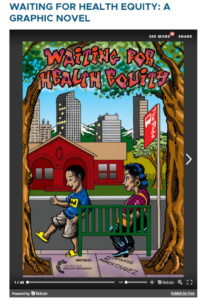Healthy, thriving communities use all sectors to make better health possible for all residents. This track will focus on creating a complete picture of health, from physical environments and planning to strategies for promoting mental health.
Presenters:
 Dana Kennedy, Director of Community Partnerships at the Center for Health Progress. Dana has spent more than a decade working in community health. She has connected homeless youth to health and social services in New York, built a school garden in Ecuador, and facilitated HIV prevention workshops in Colorado. Prior to working at Center for Health Progress, she spent several years building programs that increase access to health coverage and care for low-income Coloradans. At Center for Health Progress, Dana combines her public health expertise and passion for connecting with people from all walks of life to build partnerships and relationships that advance health equity across Colorado. She additionally serves on the Mile High Connects Transit Advisory Council and the board of the Westwood Food Cooperative. Dana holds a bachelor’s in urban studies from Vassar College and a master’s in public health from the University of Colorado.
Dana Kennedy, Director of Community Partnerships at the Center for Health Progress. Dana has spent more than a decade working in community health. She has connected homeless youth to health and social services in New York, built a school garden in Ecuador, and facilitated HIV prevention workshops in Colorado. Prior to working at Center for Health Progress, she spent several years building programs that increase access to health coverage and care for low-income Coloradans. At Center for Health Progress, Dana combines her public health expertise and passion for connecting with people from all walks of life to build partnerships and relationships that advance health equity across Colorado. She additionally serves on the Mile High Connects Transit Advisory Council and the board of the Westwood Food Cooperative. Dana holds a bachelor’s in urban studies from Vassar College and a master’s in public health from the University of Colorado.
 Chris Lyttle, Public Policy Manager at the Center for Health Progress. Chris is committed to advocating for a health system that is equitable and responsive to the needs of all communities. He uses research and strategic reasoning to support our community organizers in creating and implementing pathways to achieve systems-level change for campaigns and issues identified by the Coloradans we work alongside. A former legislative aide and field organizer, he has seen firsthand the positive impact of empowering community members who feel they have previously been left out and left behind. An Ohio transplant, Chris holds a bachelor’s in political science and history from Miami University (Oxford), and a juris doctor from Capital University Law School.
Chris Lyttle, Public Policy Manager at the Center for Health Progress. Chris is committed to advocating for a health system that is equitable and responsive to the needs of all communities. He uses research and strategic reasoning to support our community organizers in creating and implementing pathways to achieve systems-level change for campaigns and issues identified by the Coloradans we work alongside. A former legislative aide and field organizer, he has seen firsthand the positive impact of empowering community members who feel they have previously been left out and left behind. An Ohio transplant, Chris holds a bachelor’s in political science and history from Miami University (Oxford), and a juris doctor from Capital University Law School.
Waiting for Health Equity- Workshop Spotlight
The United States’ long history of oppressive policies and practices has led to significant and persistent health inequities, or preventable difference in health outcomes across certain groups across the nation. A person’s race or ethnicity, ability, sexual orientation, gender, socioeconomic status, geography, citizenship status, or religion should not determine a person’s health outcomes or life expectancy. Eliminating these disparities and achieving health equity will require health care interventions to shift upstream, from addressing individual health behaviors to confronting and dismantling social and institutional inequities.
As professionals with influence over policies and practices (whether we do organizing, government work, or academia, it is essential that we deepen our understanding of the root causes of preventable health disparities, including institutional racism and structural oppression. Knowledge and skills around this issue inform the work of academia, organizing, and government work that directly affect the policies and practices that influence equity; the services and people who develop and implement them are part of institutions that play a key role in perpetuating and/or dismantling inequities.
The purpose of this skill-building session is to first build a collective awareness of social and institutional inequities and then spend time becoming more comfortable and building capacity to have these conversations that are essential in our work toward eliminating preventable health disparities. To do this, we will explore our shared history and reflect on our own lived experiences in the context of, Waiting for Health Equity, a graphic novel written by Center for Health Progress that centers on diverse Coloradans’ lived experiences. We will then brainstorm how we as professional can continue to learn and act to dismantle structural inequities in our work and institutions.




